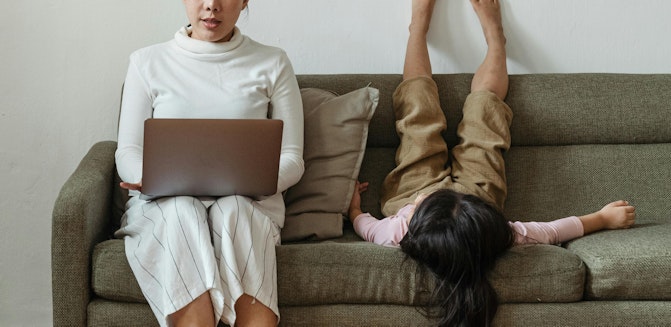If you or someone you care about is in crisis, text or call 988 or explore other crisis services for 24/7 help
How To Calm Anxiety at Night: 8 Strategies You Haven’t Tried Yet

How To Calm Anxiety at Night: 8 Strategies You Haven’t Tried Yet
If you find your anxiety kicking into high gear every night when you try to sleep, we feel your pain. Here are 8 expert-approved strategies to quell your nighttime anxiety.

AUTHOR
Ashley Laderer
Writer, Project Healthy Minds

CLINICAL REVIEWER
Dr. Andy Sekel, PhD
Board Member, Project Healthy Minds

AUTHOR
Ashley Laderer
Writer, Project Healthy Minds

CLINICAL REVIEWER
Dr. Andy Sekel, PhD
Board Member, Project Healthy Minds
Nov 5
Est Reading Time: 7 mins
Key Points
When the busyness of the day stops, nighttime anxiety can surface. Stillness creates space for unresolved emotions that stayed buried during the day.
Create a wind-down routine before bed. Try gentle stretching, meditation, a bath, or calming music to activate your rest-and-digest response and ease into sleep.
Keep a "mental dump list" by your bed. Write down worries and to-dos so your brain knows they're captured and can let them go.
If you can't sleep after 15-20 minutes, get out of bed. Go to another room and do something calming—this helps your brain connect bed with sleep, not worry.
You know when you’re feeling tired, but as soon as your head hits the pillow and you close your eyes, your mind goes into overdrive? You start obsessing over worst-case scenarios, your never-ending to-do list, and a million other anxious thoughts. Then, you start getting more anxious because you’re thinking about how few hours of sleep you’ll get and how exhausted you’ll be tomorrow. Yeah, nighttime anxiety is the worst.
It feels like purgatory. The more you try to stop worrying and the harder you try to fall asleep, the more out of reach sleep becomes. Next thing you know, it’s 4 AM and you haven’t gotten a wink of sleep.
So…why does nighttime anxiety suck so bad and hit so hard?
“During the day, most of us are in a constant state of doing—working, multitasking, interacting with others, or scrolling through screens. This level of busyness can act as a buffer, keeping deeper emotions and anxieties at bay,” says licensed professional counselor Alyssa Scolari. “But when the day winds down and the noise quiets, we’re often left with the thoughts and feelings we’ve been avoiding. The stillness of nighttime creates space for unresolved emotions to surface—whether that’s worry, loneliness, or unprocessed stress from the day.”
BTW, if you’re dealing with this, I feel your pain. I used to have a panic attack almost every night in bed, and spent many nights awake until the sun came up. That’s why I wanted to chat with experts to compile some tips that will actually help, rather than the same boring sleep hygiene advice that you’ve heard 100 times. And — I want to remind you, it won't be this way forever, I promise.
Here are eight therapist-approved (and anxious person-approved) tips for managing nighttime anxiety, along with advice for getting professional support.
How to calm anxiety at night
Sure, “sleep hygiene" tips that you’ve heard before (like sleeping in a dark, cool room, having a consistent sleep schedule, avoiding caffeine in the afternoon/evening, and cutting back on screen time before bed) might improve your chances of falling asleep more easily — but if you struggle with intense bedtime and sleep anxiety, you’re going to need more than sleep hygiene. You need to address the root of the sleep troubles: your anxiety.
Here are eight options you can try to calm anxiety at night and finally get some better sleep.
1. Create a “buffer zone” before bed
If you’re jumping right from normal activities straight to the pillow, it’s no wonder that your mind is still active. “You can't expect to be going 95 mph during the day and hop into bed and fall asleep right away,” says sleep psychologist Dr. Sarah Silverman. “Your brain needs time to slow the brakes, wind down, and decompress from the day.”
That’s why it’s important to create a buffer zone at night where you give your mind and body time to slow down. During this calming wind-down time, do things that make your time feel relaxing, luxurious, or spa-like — whatever is most appealing to you. “You want bedtime to feel like something to look forward to, not something that’s anxiety-provoking,” Dr. Silverman says. She suggests the following ideas:
Do some gentle stretching or yoga
Listen to calming music
Take a bath or shower
Meditate
Make a cup of tea (decaf, of course)
Diffusing relaxing essential oils
Make your lighting more cozy
These activities will help your sympathetic nervous system (the fight-or-flight response) shut down and your parasympathetic nervous system (rest-and-digest response) turn on, promoting relaxation and quality sleep.
2. Write a “mental dump list”
If you get that sudden rush of thoughts as soon as you lie down, this one’s for you. “The brain, no longer occupied by external tasks, takes the opportunity to unload everything — worries, reminders, regrets, and random ideas,” says Scolari. “Creating a ‘mental dump list’ is a way of acknowledging these thoughts without getting stuck in them.”
Scolari suggests keeping a dedicated notebook near your bed for this purpose. Take a few minutes to write down whatever is on your mind, be it your to-do list for tomorrow, stuff you want to remember, or worries that won’t go away, she says. “You're telling your brain, ‘I’ve got this written down. I can let it go for now.’ It’s surprisingly effective for reducing rumination and preventing the kind of cyclical thinking that often hijacks sleep.”
3. Try magnesium
“Magnesium is a mineral that plays a crucial role in nervous system regulation, muscle relaxation, and sleep quality,” says Scolari. However, many people don’t get enough magnesium in their diet.
The Sleep Foundation supports magnesium as a potential aid in getting better sleep. You can eat more magnesium-rich foods, such as leafy greens, nuts, whole grains, and soy products. Or, you can try a magnesium supplement — but always check with your doctor first before adding any new supplements to your routine.
Additionally, you can take an Epsom salt bath (which is magnesium sulfate) to relax your muscles and calm down the nervous system before bed, Scolari says.
4. Try EFT tapping
Emotional freedom technique (EFT), also known simply as “tapping,” is a simple powerful tool for calming the nervous system, Scolari says. “It involves lightly tapping on a series of acupressure points — typically on the face, collarbone, and hands — while mentally tuning into the thought or emotion that’s causing distress.”
This relaxation technique combines elements of cognitive behavioral therapy (CBT) with somatic stimulation, Scolari says. “You’re not just thinking through the anxiety—you’re physically engaging the body in the process of releasing it,” she adds. “For those who feel overwhelmed by meditation or can't quiet their thoughts, EFT can offer a more active, embodied way to de-escalate nighttime anxiety.”
The best way to learn this is through watching and doing. There are many videos on YouTube, and Scolari recommends Tap with Brad if you’re new to the practice.
5. Don’t even think about looking at the clock
You know the feeling of horror when you look at the clock and it’s later than you want it to be. Avoiding knowing the time makes a bigger difference than you think. “This helps to reduce any mental activation or a racing mind,” Dr. Silverman says. “Checking the time only increases worry about being awake and not sleeping and tends to increase sleep-related worry.”
If you lack self-control (same), consider covering up digital clocks or that area of your phone with a piece of tape or keep them out of your room altogether, says Dr. Silverman.
6. Try “stimulus control”
Stimulus control is a core behavioral technique used in cognitive-behavioral therapy for insomnia, or CBT-I. It’s the practice of getting out of bed and going to another room if you can’t fall asleep within around 15-20 minutes, Dr. Silverman says. Chances are, if you’re feeling super awake and active-minded for that long, you’re going to struggle.
“Over time, this practice helps your brain associate your bed as a place for sleep, rather than a place for worry, thinking, and stress,” says Dr. Silverman. “In the other room, it is recommended to engage in an activity that is both calming and enjoyable to you, and only return to bed when you are feeling sleepy.” You don’t have to sit in the darkness, but don’t have the lighting so bright that it confuses your brain.
7. Never try to force sleep to happen
“Sleep is a process that can’t be forced. In fact, the more that you try to make sleep happen, the more elusive sleep becomes,” Dr. Silverman explains. “Whenever your brain senses that there's any pressure to sleep, it usually switches into stress mode (fight-or-flight), and this usually backfires, making it even more challenging to fall asleep.”
Tell yourself that sleep comes in waves, and if you miss one wave, another will come, Dr. Silverman says. Telling yourself that you’ll fall asleep eventually, instead of focusing on how annoyed you are that you can’t sleep, can help lower your sleep anxiety level and make a difference.
8. Pretend you don’t care about falling asleep
This one is my personal favorite, as an ex-insomniac, and honestly, it was a game changer. Try to trick your brain into thinking that it doesn’t matter if you fall asleep. I’ll tell myself, “It doesn’t matter if I’m up late. I don’t care if I fall asleep” – and that makes me fall asleep faster than if my brain is thinking, “Oh my god! I’m never gonna be able to fall asleep! I’m gonna be exhausted tomorrow and not be able to function!”
Also, I get real with myself and tell myself that regardless of whether I sleep 10 hours or 5, I’m still going to feel like I don’t want to get out of bed and in desperate need of a coffee. It helps take the pressure off and reduce sleep anxiety.
When to seek professional help for nighttime anxiety
If your anxiety is stopping you from falling asleep or staying asleep most nights for at least a few weeks, it’s a good idea to seek professional help, Dr. Silverman says. “This is especially true if you’re worrying about your sleep or how you might function the next day as a result of how well you sleep,” she says.
Another helpful guide is the 30-30-3 rule, she says. Ask yourself:
Does it take 30 minutes or more for you to fall asleep?
Are you up for more than 30 minutes in the middle of the night?
Are these things happening at least 3 nights a week?
These are potential signs of insomnia and a reason to consult a professional. Sleep deprivation is no fun and can lead to even further heightened anxiety.
Additionally, if you’re struggling with a lot of anxiety symptoms during the day, too, and feel like you can’t control your worry, are having daytime panic attacks, or anything else that’s getting in the way of your functioning or quality of life for more than a few weeks, it’s worth bringing it up with your doctor or a mental health professional to discuss the possibility of an anxiety disorder and how you can get help.
Looking for sleep support?
If you’re struggling, Project Healthy Minds can help you find the support you need.
Restful sleep awaits — sweet dreams!
Apps to help you sleep
The Healthy Minds Blog
Everything you needed to know about your emotional life but were too afraid to ask

Nov 5
Est Reading Time: 7 mins
Anxiety can feel overwhelming, but you're not alone. We'll guide you through the anxiety self-assessment, explain what the scores mean, and share helpful tips to move forward.
Read More

Nov 5
Est Reading Time: 8 mins
Crippling anxiety and uncertainty about the future? Check. Crushing under the weight of societal expectations? Double check. Welcome to your quarter life crisis.
Read More
This content is for informational purposes only and is not a substitute for professional advice, diagnosis, or treatment. If you're in crisis, visit our Crisis Services page or call 988 for the Suicide & Crisis Lifeline. Call 911 if you're in immediate danger.
Project Healthy Minds does not endorse any specific services or providers.
© 2025 Project Healthy Minds Corporation. All rights reserved. Project Healthy Minds Corporation is a qualified 501(c)(3) tax-exempt organization. Tax ID Number: 82-3616589. By accessing or using this website, you agree to the terms, conditions, statements, disclosures and policies in our Terms of Use and Privacy Policy.
Loading Amplitude Guides and Surveys...
